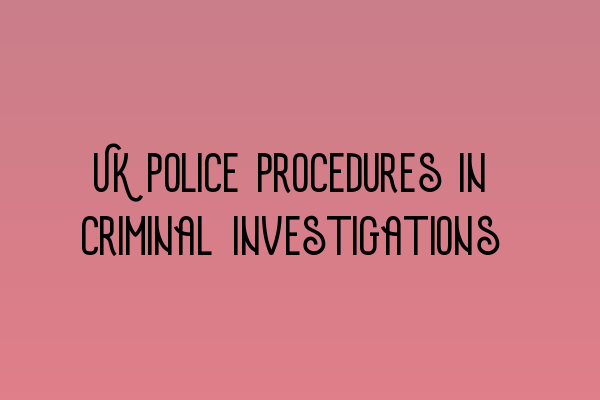UK Police Procedures in Criminal Investigations
When it comes to criminal investigations in the UK, understanding the procedures followed by the police is crucial. These procedures ensure that investigations are conducted lawfully and fairly, while also protecting the rights of the accused. In this article, we will explore the key steps involved in UK police procedures during criminal investigations.
1. Initial Investigation:
The first step in a criminal investigation is the initial response to an incident. When police receive a report of a crime, they will promptly assess the situation and take necessary actions. This may involve securing the crime scene, gathering evidence, and interviewing witnesses.
For aspiring solicitors, it is important to have a solid understanding of the SQE exam format and the essential study materials available. You can find more information in our article on SQE Exam Prep: Essential Study Materials for Aspiring Solicitors.
2. Arrest:
If the police have reasonable grounds to suspect that a person has committed a crime, they may proceed to arrest them. The arrest process involves informing the person of their rights, including the right to legal representation. It is crucial for individuals to be aware of their rights during an arrest.
To gain a deeper understanding of the Solicitors Qualifying Examination format, you can read our comprehensive article on Demystifying the Solicitors Qualifying Examination Format.
3. Questioning and Interviewing:
Once a person is arrested, they may be questioned or interviewed by the police. The purpose of this is to gather information and evidence relevant to the investigation. It is important for individuals to have legal representation during these proceedings to ensure their rights are protected.
If you are an international lawyer preparing for the SQE exam, we have a dedicated article on SQE Exam for International Lawyers: Challenges and Success Strategies that provides valuable insights.
4. Investigation and Evidence Collection:
The investigation process involves gathering evidence through various means, including forensic analysis, witness statements, and CCTV footage. This evidence is crucial in establishing the facts of the case and determining whether there is enough evidence to proceed with a prosecution.
For entrepreneurs in the UK considering LLC formation, our step-by-step guide on LLC Formation Made Simple: Step-by-Step Guide for UK Entrepreneurs provides a comprehensive overview of the process.
5. Decision to Prosecute:
After the investigation is complete, the police will review the evidence and make a decision on whether to proceed with a prosecution. This decision is based on the available evidence and the public interest in pursuing the case. It is important for the decision-making process to be fair and impartial.
Our article on LLC Formation: A Step-by-Step Guide for UK Entrepreneurs provides detailed information on the steps involved in forming an LLC for entrepreneurs in the UK.
6. Court Proceedings:
If a decision is made to prosecute, the case will proceed to court. It is at this stage that the accused will have the opportunity to present their defense and challenge the evidence against them. It is the role of solicitors to provide legal representation and support to individuals throughout the court proceedings.
In conclusion, understanding UK police procedures in criminal investigations is essential for aspiring solicitors and anyone involved in the legal field. By following proper procedures, the police can uphold the law while protecting the rights of all individuals involved. If you want to learn more about the Solicitors Qualifying Examination and how to prepare for it, check out our recommended study materials in our article on SQE Exam Prep: Essential Study Materials for Aspiring Solicitors.
